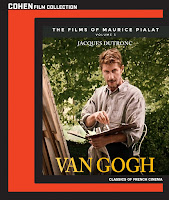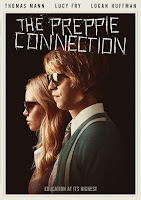- Details
-
Parent Category: Film and the Arts
-
Category: Reviews
-
Published on Tuesday, 26 July 2016 12:57
-
Written by Kevin Filipski
Barbershop—The Next Cut
(Warner Bros)
For much of its running time, this quite belated sequel has very little happening: its shaggy-dog plot strands allow its characters to often just sit around and talk to, at and through one another.
The funniest moments include those conversations, as the zingers fly, the insults are generated and the cast simply goes with the flow. Standouts in the cast for their witty asides are Cedric the Entertainer, Anthony Anderson and Eve. There’s a quite good Blu-ray transfer; extras include a featurette, deleted scenes and a gag reel.
(Lionsgate)
John Travolta—nearly unrecognizable under what looks to be a mash-up of make-up and plastic surgery—plays a pseudo-Charles Bronson in this sub-Death Wish revenge flick about a man who tracks down the killers of his wife (poor Rebecca DeMornay), who was offed in front of him.
The plot gives nobody a chance to do anything resembling acting, and the clichéd story beats, which are hit every step of the way, keep this from even becoming a guilty pleasure. The hi-def transfer looks decent; lone extra is a director and writer commentary.
(Virgil Films)
The souped-up DeLorean that was the centerpiece of the beloved Back to the Future trilogy is also front and center of Steve Concotelli’s engaging documentary that recounts how it’s being restored to its pride of place among the most famous movie memorabilia.
It seems that saving a relic from a 30-year-old fantasy film isn’t worth the slavish attention the car receives, but I’m obviously an outlier: I enjoyed the original but hated the two sequels. The hi-def transfer is fine; extras include a commentary, deleted scenes and featurettes.
The Outsider
Hoodlum
(Olive Films)
1980’s The Outsider is director-writer Tony Luraschi’s involving drama about the IRA, with a largely unknown cast underpinning its straightforward exploration of how an Irish-American celebrity finds himself transformed into propaganda when he returns to Ireland.
In 1997’s Hoodlum, Laurence Fishburne adroitly plays real-life gangster Bumpy Johnson and the 1920s Harlem mobster scene. Bill Duke’s colorful production includes an array of stars, from Tim Roth as Dutch Schultz and Andy Garcia as Lucky Luciano to Vanessa Williams as Johnson’s sexy moll. Both films’ solid hi-def transfers have sparkling grain.
(IFC)
Set in the war-torn former Yugoslavia in 1995, this drama about a group of war-zone rescuer workers has a lot of strong moments of insight mixed with charcoal black comedy while it shows (for the millionth time) the absurdity of war.
But director Fernando Leon de Aranda never brings its tonal shifts into some kind of coherence, all but stranding a game cast led by Benicio del Toro, Tim Robbins, Olga Kurylenko and Melanie Thierry. The film looks fine on Blu; extras are interviews and making-of featurettes.
The Perfect Match
(Lionsgate)
Alone among his friends, Charlie remains the same skirt chaser he’s been since high school, earning derision and envy from all around him: when he meets the magnetic Eva, he begins a full-blown romantic relationship that threatens to destroy his rep.
This mildly amusing rom-com is greatly helped by its two stars, Terrence J and Cassie Ventura, who persuasively and charmingly play Charlie and Eva. It’s too bad that the supporting cast, especially poor Paula Patton, is pretty much wasted. The hi-def transfer is solid; extras are featurettes and a commentary.
(Olive Films)
Danny DeVito’s feature directorial debut was this satiric 1984 movie (the first made for Showtime) in which he stars as a desperate man intent on making it in Hollywood. There are few original ideas but good laughs from a solid supporting cast including DeVito’s future wife Rhea Perlman, Gerrit Graham, Kevin McCarthy and George Wendt.
It’s all a far cry from DeVito’s more daring efforts The Wars of the Roses and Hoffa, but still has its intermittent moments. The film looks acceptable but soft in hi-def; extras are four DeVito-directed shorts, deleted scenes and a featurette.
Silk Stockings
(Warner Archive)
The teaming of Fred Astaire and Cyd Charisse is what most distinguishes Rouben Mamoulian’s classy 1957 adaptation of the Broadway musical about a possible Cold War thaw between an American in Paris (Astaire) and a Russian envoy (Charisse).
The splendid widescreen compositions maximize the extraordinariness of Astaire’s and Charisse’s dancing, and Cole Porter’s tunes are equally memorable. The Blu-ray transfer is good, if not sparkling; extras are a vintage featurette and two musical shorts.
Born to Be Blue
(IFC)
Anchored by Ethan Hawke’s bravura performance as Chet Baker, the jazz trumpeter whose career was constantly being interrupted by his drug addiction (of which he died in 1988 at age 58), director-writer Robert Budreau has made a fascinating impressionistic look at a musical artist’s career.
There’s an equally great supporting portrayal by British actress Carmen Ejogo as the woman in Baker’s life; their splendid scenes both together and apart make this fictionalized biopic a must-watch. Extras are deleted scenes and a making-of.
Five Days One Summer
(Warner Archive)
Director Fred Zinnemann—who won Best Director Oscars for From Here to Eternity and A Man for All Seasons—ended his career with this turgidly melodramatic 1982 entry starring an embarrassed-looking Sean Connery as an older man in love with a much younger woman, who soon becomes interested in a much younger man.
Although Zinnemann lived another 15 years, the scathing reviews for this swore him off directing. The Swiss Alps are enchanting, but the acting by a blank-eyed Betsy Brantley and wooden Lambert Wilson is anything but.
(Cohen Media)
In this diverting if implausible heist picture, the always beguiling Berenice Bejo charms as a woman who stupidly allows a stranger into her life without the slightest bit of questioning that he may not be whom he seems.
Director Eric Barbier tries too hard to make this lighthearted—think Hitchcock’s To Catch a Thief—but, although Bejo easily equals Grace Kelly’s elegance, Yves Attal is certainly no Cary Grant. Extras comprise interviews with Bejo, Attal and Barbier and a short making-of featurette.












































